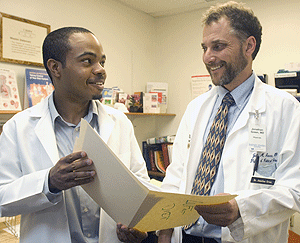For someone who didn’t exactly know what he wanted to do after college as recently as his junior year, Kendrick Gwynn sure has figured out a plan in a hurry.
Gwynn, a biology major in Arts & Sciences who will receive a bachelor’s degree May 18, plans to attend medical school in the fall and work toward a medical degree and a master of public health at the same time.

His decision stemmed from two experiences he’s had during his undergraduate years.
First, he returned home to Maryland during the summers and worked in a summer research program.
“For two years, I worked with Project Export, a health-disparities research training program at the University of Maryland,” Gwynn says. “My mentor was an epidemiologist, and I worked with her doing basic studies of race and ethnicity in medicine. One year, I researched race and ethnicity and pharmaceutical drugs, and the second year, I looked at race and ethnicity and how it’s presented in medical texts.”
The other experience was volunteering for the non-profit free clinic Community Health-In-Partnership Services on North Grand Boulevard in St. Louis. The clinic provides primary care, health screenings, wellness programs and support groups for the underserved and uninsured regardless of ability to pay.
“Most free clinics that are federally sponsored still charge a fee for patients,” Gwynn says. “This clinic is a comprehensive holistic clinic — it has everything from internal medicine, acupuncture, behavioral support groups, diabetic support groups, and it has a social worker on staff. It’s a very holistic model.”
The clinic also has a large community outreach program, for which Gwynn volunteered during his sophomore and senior years, taking time off only for studying — and taking — the MCAT, the medical school entrance exam.
Through those experiences, Gwynn realized that despite being somewhat undecided about his future, he wanted to help those less fortunate.
And that helped make mapping out a plan much easier, at least for now.
|
College of Arts & Sciences |
“I’m not exactly sure what I want to do with it yet, but I know I want to do something with health disparities,” Gwynn says. “When I spent the two summers in the University of Maryland research program, I went to seminars and saw how big the problem is. Just within this country alone, there is a big gap between people who don’t have health insurance and those who do, and it’s not just based on race.
“That’s one of the reasons I want to go get a dual degree,” he continues. “If you have an MPH alone, you don’t have as much say as if you have the M.D., too. I think you can make a lot more change if you have both of those degrees. Also, if you are a doctor, you are trained to deal specifically with the patient, whereas in public health, you are trained to deal with the population as a whole.
“Plus, I’ve always had an interest in doing a socially active thing,” he adds.
Which was evident from his days at the McDonogh School in Owings Mills, Md. Sharon Howell, director of diversity at McDonogh, started a diversity initiative at the school. She found five students who were interested in tackling the issue of diversity, and those students tried to create initiatives to be presented to school administrators.
Gwynn was one of her students.
“Kendrick distinguished himself by affecting school change,” Howell says. “He devised a plan and employed students to assist him in a grassroots effort to modify the school’s response to hateful acts. Kendrick’s modest sense of self helped to create an atmosphere of social change and compassionate dialogue.
“Kendrick really understands the concept of teamwork,” she adds. “He’s unselfish in his pursuit of the truth. He’s organized, focused, goal-oriented. Kendrick has a powerful passion for equality and justice.”
It appears he’s found the right path.